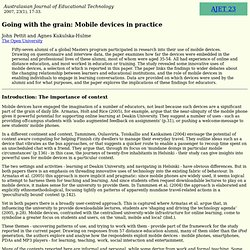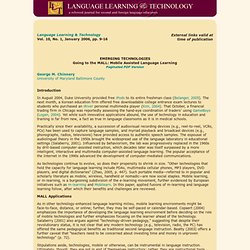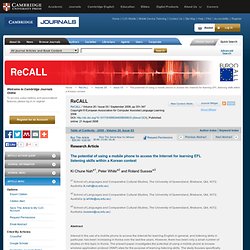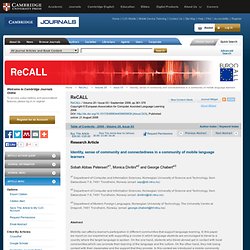

Sharples_et_al_Theory_of_Mobile_Learning_preprint.pdf (Objet application/pdf) Chap-mobile-learning2010-endrizzi-v2.pdf (Objet application/pdf) Vol 6, No 1 (2010) AJET 23(1) Pettit and Kukulska-Hulme (2007) - Going with the grain: Mobile devices in practice. John Pettit and Agnes Kukulska-HulmeThe Open University Fifty-seven alumni of a global Masters program participated in research into their use of mobile devices.

Drawing on questionnaire and interview data, the paper examines how far the devices were embedded in the personal and professional lives of these alumni, most of whom were aged 35-54. All had experience of online and distance education, and most worked in education or training. The study revealed some innovative uses of mobile devices, a selection of which is reported in this paper. The paper links the findings to wider debates about the changing relationship between learners and educational institutions, and the role of mobile devices in enabling individuals to engage in learning conversations. Introduction: The importance of context Mobile devices have engaged the imagination of a number of educators, not least because such devices are a significant part of the grain of daily life. Who's powerful now? The mobile promise Content.
Ijmblproof01.pdf (Objet application/pdf) MALL: M-learning et l’apprentissage des langues » Groupe Compas. 13.pdf (Objet application/pdf) Stockwell_ReCALL_2008.pdf (Objet application/pdf) Pettit_chap_lee_book.pdf (Objet application/pdf) Epal2009-kim-mangenot.pdf (Objet application/pdf) Fulltext - undefined. LLT Vol 10 Num 1: EMERGING TECHNOLOGIES Going to the MALL: Mobile Assisted Language Learning. George M.

Chinnery University of Maryland Baltimore County Introduction In August 2004, Duke University provided free iPods to its entire freshman class (Belanger, 2005). The next month, a Korean education firm offered free downloadable college entrance exam lectures to students who purchased an iRiver personal multimedia player (Kim, 2004). That October, a financial trading firm in Chicago was reportedly assessing the hand-eye coordination of traders’ using GameBoys (Logan, 2004). Practically since their availability, a succession of audiovisual recording devices (e.g., reel-to-reel, VCRs, PCs) has been used to capture language samples, and myriad playback and broadcast devices (e.g., phonographs, radios, televisions) have provided access to authentic speech samples.
As technologies continue to evolve, so does their propensity to shrink in size. MALL Applications. AKH_ReCALL_Will_mobile_learning_change_language_learning.pdf (Objet application/pdf) Fulltext - undefined. Research Article The potential of using a mobile phone to access the Internet for learning EFL listening skills within a Korean context Ki Chune Naha1, Peter Whitea2 and Roland Sussexa3 a1 School of Languages and Comparative Cultural Studies, The University of Queensland, Brisbane, Qld, 4072, Australia (k.nah@uq.edu.au) a2 School of Languages and Comparative Cultural Studies, The University of Queensland, Brisbane, Qld, 4072, Australia (p.white@uq.edu.au) a3 School of Languages and Comparative Cultural Studies, The University of Queensland, Brisbane, Qld, 4072, Australia (sussex@uq.edu.au) Abstract Interest in the use of a mobile phone to access the Internet for learning English in general, and listening skills in particular, has been increasing in Korea over the last few years.

Fulltext - undefined. Research Article Identity, sense of community and connectedness in a community of mobile language learners Sobah Abbas Petersena1, Monica Divitinia2 and George Chaberta3 a1 Department of Computer and Information Sciences, Norwegian University of Science and Technology, Sem Sælandsvei 7-9, 7491 Trondheim, Norway (email: sap@idi.ntnu.no) a2 Department of Computer and Information Sciences, Norwegian University of Science and Technology, Sem Sælandsvei 7-9, 7491 Trondheim, Norway (email: divitini@idi.ntnu.no)

OU Knowledge Network - MALL Survey Summary of Results 1 July 2009.